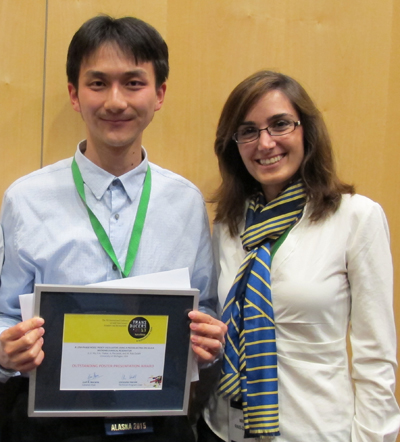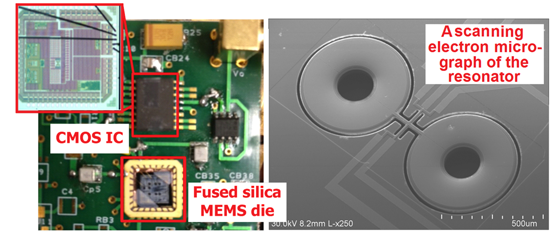MEMS research recognized with Best Poster Award at 2013 Transducers Conference
This research is targeted at developing a precision master clock for a chip-scale Timing and Inertial Measurement Unit.

 Enlarge
Enlarge
Doctoral students Zhengzheng Wu, Vikram Thakar, Adam Peczalski, and their advisor Prof. Mina Rais-Zadeh received a Best Poster Award at the 17th International Conference on Solid-State Sensors, Actuators and Microsystems (Transducers ’13) for their paper entitled “A low phase-noise Pierce oscillator using a piezoelectric-on-silica micromechanical resonator.”
The paper reports on a high-performance electrical oscillator using a fused silica micro-electromechanical resonator. Fused silica, a high-purity transparent glass, has been known for its excellent optical properties. The mechanical properties of silica – such as extremely low thermal conductivity, small thermal expansion coefficient, and low acoustic loss -have been exploited in this work to realize high-quality factor micromechanical resonators.
This work demonstrates fused silica resonators that are highly miniaturized and suitable for batch fabrication, and overcomes the challenge of transducing signals between electrical and mechanical domains using a thin layer of a piezoelectric aluminum nitride layer. The miniature silica resonator is interfaced directly to a custom designed integrated circuit using 180 nm commercial CMOS process to realize a low-noise oscillator, which promotes state-of-the-art for integrated MEMS frequency references.
Two frequency tuning techniques have also been demonstrated, which can be used to compensate for the oscillator frequency drift and variations due to temperature or other environmental effects. Silica micro-resonators exhibit low vibration sensitivity, making them a good candidate for applications in dynamic platforms. The results pave the way for realizing highly integrated silica-based MEMS.

 Enlarge
Enlarge
This research is targeted at developing a precision master clock for a chip-scale Timing and Inertial Measurement Unit (TIMU). The goal of the TIMU program is deep integration of high-performance inertial sensors and timing reference units within a small (< 10 mm3) microsystem, enabling advanced precision navigation, guidance, and control capabilities in GPS denied environments.
The work is funded by DARPA and is in collaboration with Prof. Khalil Najafi’s group. Prof. Mina Rais-Zadeh directs the Resonant MEMS Group and leads the “High-Frequency MEMS” Thrust of the Center for Wireless Integrated MicroSensing & Systems (WIMS2).
 MENU
MENU 
